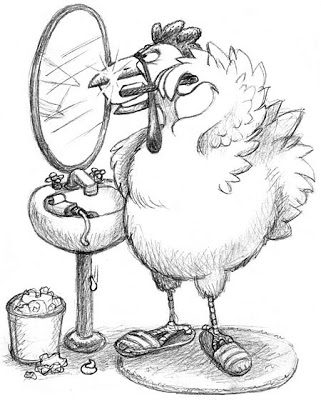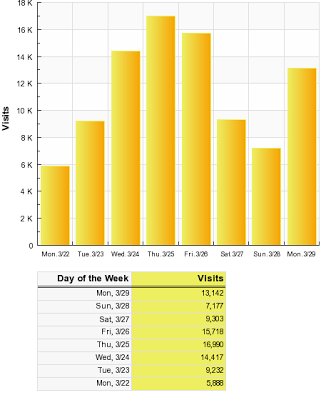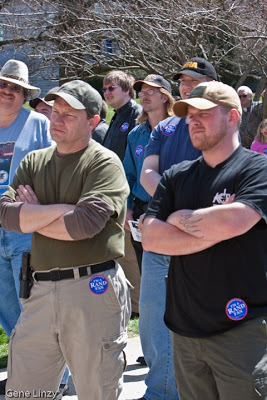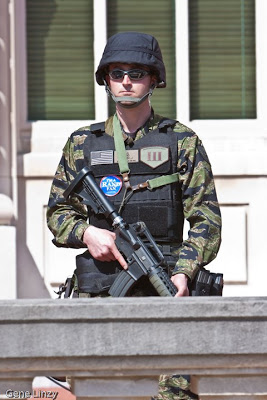
CPT R.A. Bear sez: "I think I'm in love."
The transcript:
All right. This is an interesting topic. You may not have been thinking that this was a big deal, but it is. I want to bring in Amy Cooter. She's working toward a Ph.D. in sociology at the University of Michigan, and that has meant two years of research into the Michigan militia and similar groups. She joins me now from Ann Harbor.
Amy, this is not news to you, but it is news to a number of Americans, the degree and the scope and the scale of these anti- government groups and how many of them are willing to take up arms to do what? What is the aim? What did you learn? What do these people want to achieve?
AMY COOTER, UNIVERSITY OF MICHIGAN PH.D. CANDIDATE: You know, the vast majority of this movement aren't so antagonistic toward the government that they're ready to start a fight. I think what we've seen with this group that's been in the news these last few days is sort of the extreme of this movement.
Most of the militia movements see their involvement as more of a political protest than anything. They do practice. They do target practice and general training with firearms. But for the most part, they're not particularly afraid of the government and aren't worried about them banging down their door and coming after their individual rights.
VELSHI: So in this fight that may happen between them and the government, where do the rest of us fall? Is this a fight? Do they imagine it to be a war? Or is it a "we're armed, and don't -- don't interfere in our lives"?
COOTER: You know, for the most part, like I said, most of these groups don't see this war as coming. For those that do, I think that they see themselves as a last line of defense for their communities. They don't see the average, everyday citizen as being on the side of the federal government or as being a target of their activity, for the most part.
VELSHI: Amy, stay right there. I want to talk about how these people we recruit, who's joining them and whether or not there are people who might be our neighbors. Stand by.
Amy Cooter is with us from Ann Harbor, Michigan. She's a doctoral candidate. She's studying -- she's doing -- she's studying for her Ph.D. at the University of Michigan. We're going to talk about these groups that may or may not be a threat to you. She'll tell us whether those extremist groups are, in fact, a threat. Stay with us.
(COMMERCIAL BREAK)
(BEGIN VIDEO CLIP)
MARK POTOK, SOUTHERN POVERTY LAW CENTER: In the case of this group, it was all cast in terms of the coming of the anti-Christ, which the group seemed to associate very closely, in fact, with the United Nations. So it's really quite similar to other militias' ideology but with a very particular biblical kind of twist.
(END VIDEO CLIP)
VELSHI: We're rejoined by Amy Cooter. She's a doctoral candidate at the University of Michigan.
Amy, you have spent time with -- have you spent time with the Hutaree or other groups?
COOTER: Mostly with other groups, since the Hutaree is this fringe element that isn't representative of the overall movement.
VELSHI: All right. So the people you've spent time with, I would almost say you've been embedded with them; you've spent sort of really good time with them, a lot of time with them. How would you describe them? Would they -- would they strike us as sort of everyday, normal Americans with concerns about too much government, or is there something more? Do they have more of an edge to them? COOTER: I think that most people would be surprised at how normal they are. Some of them have government jobs. In my interviews with them, most of them are actually slightly more educated than the average U.S. citizen.
The overall movement, they're not particularly religious. Most of them are married, have kids. And you wouldn't know they were militia members if you encountered them in the grocery store, unless they happen to have their militia T-shirt on.
VELSHI: And what -- so what drives them? What's their big concern here? Is it too much government or is it something more than that?
COOTER: You know, a lot of these militia members are a little concerned about big government. They feel that the Constitution isn't being followed to the letter of the law. They usually don't see it as a living document.
And for a lot of them, their militia involvement is kind of a political statement, as well as a way for them to continue military service in this patriot sentiment that a lot of them share.
VELSHI: Are they attracting sort of fringe folks who like weapons and might be sort of hoping that there's some kind of battle? Are they -- is there an element in there like the Hutaree that may be sort of not what you're describing?
COOTER: To be honest, that's pretty rare. If those people show up to the meetings of the main group, they're usually either asked to leave, if they're very forward about their ideology, or they quickly figure out that this group isn't going to offer them the opportunity to do that, and they fall out. They may find another group like Hutaree, but those groups are fairly rare.
VELSHI: What -- so what, then, is the motivator? If you feel like the Constitution is not being followed, that there is too much government, what is the motivation to join one of these militias? What are you going to get out of it? What's the takeaway for them?
COOTER: Well, as I mentioned, a lot of it is sort of this protest activity. They feel like they're not especially represented in the Tea Party system, and this is their way of saying, "Hey, we want to hold onto our guns. Don't infringe upon our Second Amendment rights."
And I think you have to be -- pay attention to the camaraderie element, too. In any social group people will band together...
VELSHI: Sure.
COOTER: ... with people who are like-minded. And a lot of the media folks who have been out to the trainings recently say, "Well, these guys look like grown-up Boy Scouts," and they're really surprised at the image they convey. VELSHI: But did you encounter anything that was like the Hutaree -- the Hutaree groups that were that much further off sort of the mainstream?
COOTER: It's pretty rare. Including the Hutaree here, there are one or two groups that look a little bit like that, yes.
VELSHI: OK. Interesting. Amy, great conversation. Thanks very much for joining us. Amy Cooter is a doctoral candidate in sociology at the University of Michigan.







